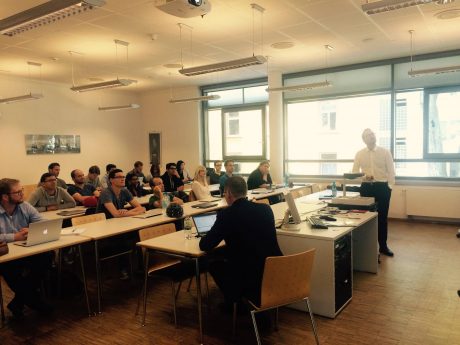Becoming a successful advisor (or as some might say: consultant) is at the core of the Master of Finance “Advisory Project” in Frankfurt School’s new Financial Accounting & Advisory (FA&A) concentration. In this module, students have one week to win two real-life clients by pitching a number of projects as if they were a new Frankfurt-based start-up consultancy agency.
The schedule was tight: Students received the task information on the Monday, and needed to have established contact with the client and completed professional sales pitches by the Friday. Working with real-life clients, the goal is to impress the client so that they want the students to submit written proposals after the first pitch.
The module’s concept simulates many facets of the realities of project management issues in advisory. The key is to develop a thorough understanding of the needs of a potential client, but to also gain an understanding of the client’s industry and the way the client makes money.
As well as the pitches, one of the highlights of the week was the visit by Dr. Markus Stritzel, a partner from Roland Berger, who along with FS-Alumnus Hanno Dachwitz, also from Roland Berger, shared his views about key success factors in winning projects. Both stressed that winning projects is the key to a successful career in consulting and they also explained how it should be done:
Firstly, identify the needs of the client. This means the consultant has to ask why and where clients need to change their approach towards their business. Secondly, consultants need to make it clear that they will be of value to the client and third of all, trust in the competencies of the advisor – including the approach and methodologies – is essential for clients to trust that consultants can deliver what they promise.

The Master of Finance students were happy to take on new advice and already seemed to be on good track. Whilst talking to Program Director Dr. Julia Knobbe in the break, Dr. Strietzel said: “They have really good questions; you see they are really into it.”
In the interactive classroom session, students had the opportunity to ask questions concerning the future of the consulting industry. Dr. Strietzel said that Roland Berger has its DNA in restructuring, but that they also focus on what he called the “German heritage”. He then went on to explain the strategy the company is going to pursue in the coming years.
When asked why they enjoy working for Roland Berger, Hanno Dachwitz said that the firm has managed to overcome what he called “silos”, that is a strict separation of departments regarding industries etc. This gives a lot of freedom in business development. Dr. Strietzel had a very straightforward answer: “I like working where I have fun. No single day is like the past. You learn all the time.”